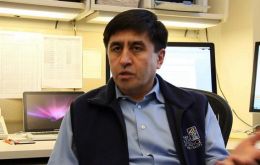MercoPress. South Atlantic News Agency
Stories for 2013
-
Thursday, May 16th 2013 - 19:23 UTC
Females take the top three seats in the new Ecuadorean National Assembly

The newly elected Ecuadorean National Assembly sat for the first time this week and next week will take the oath of office to President Rafael Correa, who was re-elected by a landslide last February. The legislative with 137 members has a majority of members from Correa’s party Alliance Country Movement, and was elected for a four-year mandate.
-
Thursday, May 16th 2013 - 19:17 UTC
US will continue to be a country of immigrants according to census projections

A wave of immigrants is set to become the principal driver of US population growth within 30 years, surpassing growth from births for the first time since the mid-1800's, federal government estimates show.
-
Thursday, May 16th 2013 - 07:13 UTC
Cristina Fernandez will veto constitutional reform even from her militant lawmakers

Argentine President Cristina Fernández is not turning back on her word and even if Kirchnerite lawmakers propose and agree on a constitutional reform, she would certainly veto it, said Senator Aníbal Fernández.
-
Thursday, May 16th 2013 - 07:10 UTC
Argentina challenges EU bio-diesel import restriction rules before WTO

Argentina has launched a challenge at the World Trade Organization against European Union rules for importing and marketing bio-diesel, the WTO said.
-
Thursday, May 16th 2013 - 07:07 UTC
Falklands’ war: Defense releases stats on deaths of military personnel

A comprehensive statistical study of the deaths of personnel deployed to the Falklands since the end of the conflict has been published in the UK. The study, by Britain’s Defense Analytical Services and Advice (DASA) was published on Tuesday 14 May and is the first of its kind.
-
Thursday, May 16th 2013 - 06:55 UTC
Argentina inflation in April was 0.7%, according to the official stats office

Argentina’s Consumer Price Index was up 0.7% in April and 3.1% in the first four months of the year according to the official stats office, Indec. Clothing, education, transport and communications were the items which experienced the strongest increase over March.
-
Thursday, May 16th 2013 - 06:50 UTC
In Bolivia and suffering from altitude sickness, try Coca beer

A Bolivian brewer has come up with an innovative solution for quenching thirst and coping with altitude sickness: coca beer, based on the same leaf used to make cocaine.
-
Thursday, May 16th 2013 - 06:41 UTC
US environmentalist donates 15.000 hectares of pristine Patagonia land for a national park

US millionaire and environmentalist Douglas Tompkins who has dedicated his life to promoting the beauty and wildlife of Patagonia will be donating one of his several estancias of pristine land to the Perito Moreno National Park in the extreme south of Argentina.
-
Thursday, May 16th 2013 - 05:25 UTC
US scientists with cloning techniques created human embryonic stem cells

For the first time, Oregon State researchers in the US have used cloning techniques to create human embryonic stem cells that could offer hope for conditions such as Parkinson's disease, diabetes and multiple sclerosis.
-
Thursday, May 16th 2013 - 03:28 UTC
Communist Germany allowed Western pharmaceutical firms testes new drugs in hospital patients

Western pharmaceutical firms allegedly conducted drug tests on unwitting patients in communist East Germany. The lucrative clinical trials enabled the GDR government to bring much needed hard currency according to a report from Deutsche Welle.
